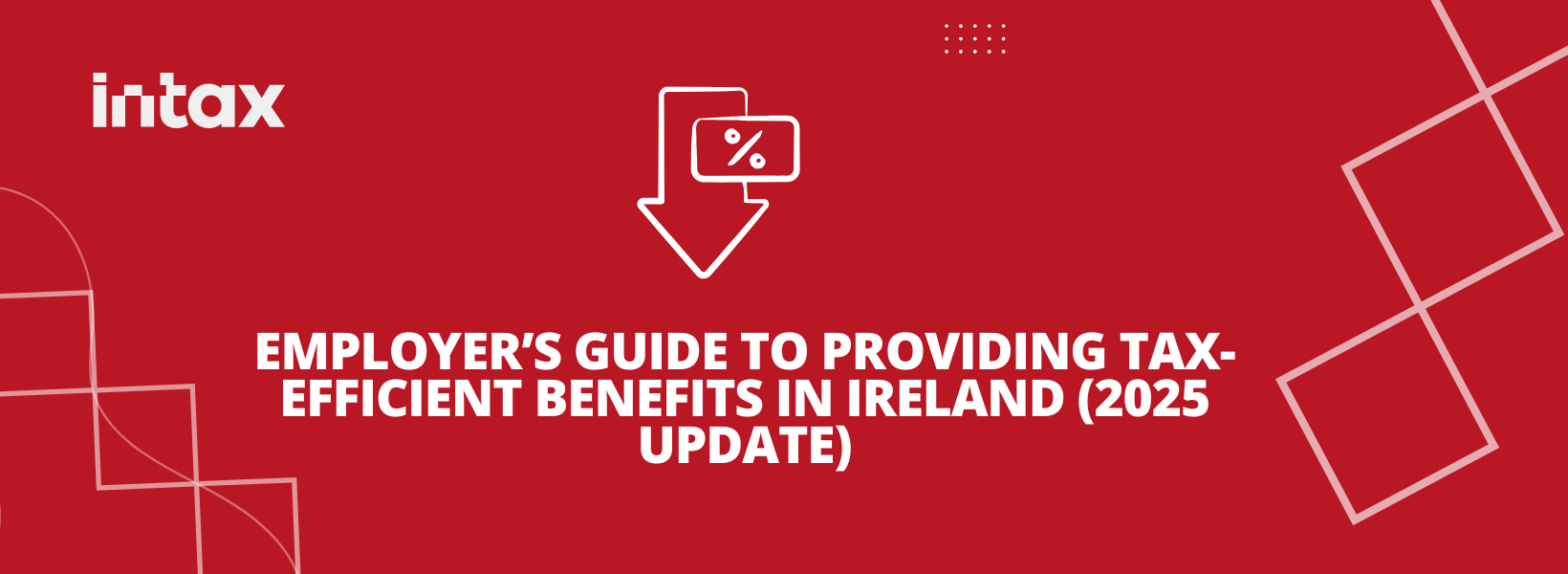Introduction
In an increasingly competitive job market, Irish employers are expected to offer more than just a paycheck. But offering more doesn’t always have to mean spending more — especially if you take advantage of Revenue-approved tax-efficient employee benefits.
Tax-efficient benefits allow employers to reward employees in meaningful ways while saving on Income Tax, PRSI, and USC. In this blog, we explore the most impactful benefits available to Irish employers in 2025 and how to structure them correctly.
1. The Small Benefit Exemption Scheme (€1,000 → Now €1,500)
As of 2025, employers can provide up to five small non-cash benefits per year, up to a total combined value of €1,500 — completely tax-free for employees.
The most common option? One4All vouchers, prepaid cards, or non-cash bonuses like gym memberships or wellness packages.
Tax Benefit:
- Completely exempt from PAYE, PRSI & USC
- No Benefit-in-Kind (BIK) reporting required
Pro Tip: The total must not exceed €1,500 in value per year, and no single benefit can exceed that amount. Cash or salary transfers do not qualify.
2. Employer Contributions to PRSA Pensions (No BIK from 2023)
From January 2023, all employer contributions to PRSAs (Personal Retirement Savings Accounts) are exempt from BIK, removing one of the last barriers to tax-efficient pension support.
Tax Benefit:
- No employee PRSI, USC, or PAYE
- Deductible business expense for the employer
- Not limited to the previous “net relevant earnings” rule
Pro Tip: While employer contributions can now exceed employee limits, Revenue still recommends staying within a reasonable percentage of salary to avoid triggering audits or administrative red flags.
3. Cycle to Work Scheme (Now up to €3,000)
Support employee health and sustainability goals by offering bikes and accessories via the Cycle to Work scheme.
Updated Limits (2025):
- €1,250 for standard bikes
- €1,500 for e-bikes
- €3,000 for cargo or e-cargo bikes
This benefit is available every 4 years, per employee.
Pro Tip: Use a salary sacrifice arrangement to recover the cost tax-free over time while offering a desirable benefit upfront.
🔗 Related Blog: Tax Tips for Freelancers and Contractors
Even self-employed contractors can use this scheme for themselves if they trade as limited companies.
4. Tax Saver Commuter Tickets
Offer annual or monthly public transport passes to employees as a fully tax-free benefit under the Travel Pass Scheme.
Highlights:
- Applies to bus, train, DART, or Luas passes
- 100% tax-free if paid directly by the employer
- Can be structured as a salary sacrifice (no cost to the business)
Pro Tip: Combine this with the Cycle to Work scheme for hybrid commuters — giving employees multiple eco-conscious travel options.
5. Remote Working Allowance (€3.20/day tax-free)
Employers can reimburse remote employees up to €3.20 per day tax-free for utility expenses (e.g. electricity, heat, broadband).
Revenue Conditions:
- Applies only to actual remote work days
- Employees must have a formal remote work agreement
- Alternatively, Revenue allows direct employee claims on tax returns
Pro Tip: To make compliance easier, offer the flat-rate allowance rather than attempting to verify individual bills.
🔗 Related Blog: Understanding Preliminary Tax: What Irish Business Owners Need to Know
Includes key deductions self-employed remote workers may also be eligible for.
6. Work-Related Equipment (Tax-Free, If Business Use)
Laptops, mobile phones, tablets, and accessories provided solely for business use are not taxable if:
- The employer retains ownership
- There’s documented justification of business need
Pro Tip: Keep clear policies and logs of issued devices, especially for employees who use them both personally and professionally.
7. Health & Wellbeing Supports
Revenue allows certain health and wellness-related benefits tax-free — including:
- Medical check-ups
- Flu shots
- COVID-19 testing (when required for employment)
- Counselling or mental health support through EAPs (employee assistance programmes)
Pro Tip: Wellness initiatives that support productivity and attendance are not just tax-smart — they build a strong internal culture.
Bonus: Don’t Forget Benefit-in-Kind (BIK) Reporting Rules
Not all benefits are fully tax-free. For any that are partially exempt or taxable, such as:
- Company cars
- Housing
- Gym memberships (if not required for work)
You’ll need to include them in real-time PAYE submissions through Revenue’s system.
Pro Tip: Use a qualified payroll service like Intax.ie to ensure your BIK tracking is accurate, especially with PAYE Modernisation in effect.
Conclusion
Tax-efficient employee benefits aren’t just about saving money — they’re about creating a competitive, compliant, and people-first workplace.
From pension support to travel perks, Irish employers now have more tools than ever to reward their teams without increasing tax liability. Just make sure you structure them correctly and stay within Revenue guidelines.





